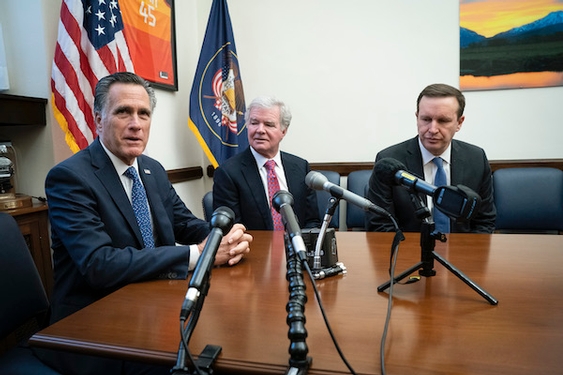The NCAA needs Congress’ help. And fast.
That’s the message NCAA President Mark Emmert delivered Tuesday at two stops in Washington, D.C., where he was seeking federal intervention as states move to allow college athletes to profit off their name, image and likeness.
“We need your help right now. I think the debate or the discussion is well past the ability of a group of states to resolve it,” Emmert said he told Sens. Mitt Romney and Chris Murphy during an earlier meeting Tuesday.
“In terms of addressing these issues and creating legally valid modeling, which the schools can provide more than they do now, whatever that may look like, has to be created at a national level and doing it state by state, with again potentially 50 different models doesn’t make any sense,” he said as part of a panel discussion.
College athletics generates more than $14 billion in revenue, a massive increase from $4 billion in the early 1990s, according to the U.S. Department of Education.
And states are moving quickly.
In September, California Gov. Gavin Newsom signed the “Fair Pay to Play Act,” a first-in-the-nation law to allow college athletes to profit off their name, image and likeness. The law, which goes into effect in 2023, ignited a rush by states to adopt similar legislation.
Emmert said as many as 30 states are debating or considering legislation on this issue. He said the laws vary widely and could create an unworkable patchwork of laws that would dramatically reshape recruiting — a nonstarter for the National Collegiate Athletic Association.
Name, image and likeness rights are shorthand for allowing players to be paid for signing autographs, appearing in a video game, starring in a commercial for a business or coaching at a camp, among other examples. Currently student-athletes are not allowed to profit off their images — even making money off their popular YouTube channel, for example, has been deemed impermissible by the NCAA.
Congress is interested, too. Romney, a Utah Republican, and Murphy, a Connecticut Democrat, formed a working group around student-athlete compensation and related issues.
The group’s first meeting was with Emmert, who has been NCAA president since 2010, on Tuesday.
Rep. Mark Walker, a North Carolina Republican, introduced legislation earlier this year that would stop the NCAA from prohibiting college athletes from making money off their name, image and likeness. He criticized the senators for having their first meeting with Emmert, who he called “the chief apologist for an exploitative system and not with the student-athletes that are being exploited.”
Walker, who appeared on a panel after Emmert at the Aspen Institute on Tuesday, questioned how much the NCAA wanted a solution. He said the NCAA, outside of one meeting, has declined requests to meet about his legislation.
“I’ve learned that having meetings and discussing things are just stall tactics in this town,” Walker said. “I have my doubts the NCAA really has a desire to resolve this. I’m hoping they’re genuine in their efforts to try to resolve this.”
In October, the NCAA’s Board of Governors directed each of the organization’s divisions, including the most popular and lucrative Division I, to consider updates that would allow college athletes to “benefit from the use of their name, image and likeness in a manner consistent with the collegiate model.” The NCAA wants recommendations by January 2021.
Emmert said the NCAA is still working out what exactly it wants from Congress. Among the NCAA’s priorities: not converting student-athletes into employees of the university; protecting the integrity of the recruiting process; and a framework for the athletes for an entire team or entire conference selling their collective license.
Already some critics are wary that a congressional solution would lean in favor of the NCAA rather than college athletes.
“If Congress rolls back anything California has done, that’s an NCAA bill. It’s very clear. That’s something we would be opposed to and try to kill,” said Ramogi Huma, the executive director of the National College Players Association and a former UCLA football player.
Murphy said he thinks changes to the NCAA system should extend far beyond the name, image and likeness issue.
“Recognize what I think a lot of Americans desire: to have more of the bounty coming out of college athletics accrue to the kids,” Murphy said Tuesday.
The Knight Commission on Intercollegiate Athletics, which has been a proponent of an overhaul for years, sent a letter to Emmert on Monday. It indicated the commission would “examine new models for alternative structures for Division I college sports, with a special emphasis on the impact of FBS football,” referring to the Football Bowl Subdivision that includes the biggest colleges.
Arne Duncan, co-chair of the commission and a former U.S. education secretary, said in the letter that it might be time to allow the biggest revenue-producing programs to “play by a different set of rules — and be upfront and honest about it.”
———
©2019 McClatchy Washington Bureau
Visit the McClatchy Washington Bureau at www.mcclatchydc.com
Distributed by Tribune Content Agency, LLC.












